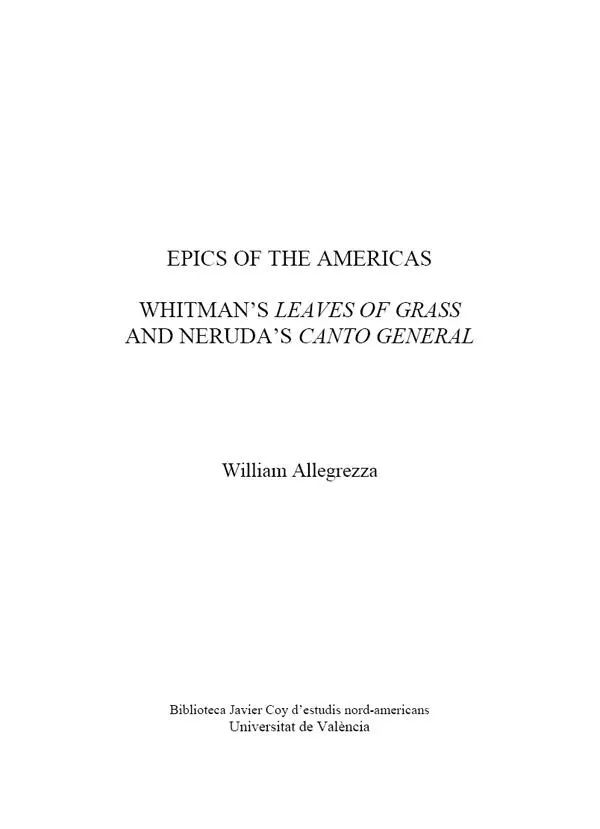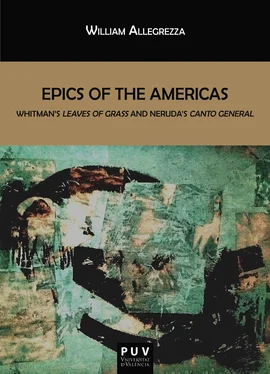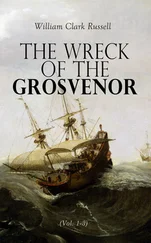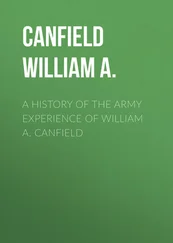William Allegrezza - Epics of the Americas
Здесь есть возможность читать онлайн «William Allegrezza - Epics of the Americas» — ознакомительный отрывок электронной книги совершенно бесплатно, а после прочтения отрывка купить полную версию. В некоторых случаях можно слушать аудио, скачать через торрент в формате fb2 и присутствует краткое содержание. Жанр: unrecognised, на английском языке. Описание произведения, (предисловие) а так же отзывы посетителей доступны на портале библиотеки ЛибКат.
- Название:Epics of the Americas
- Автор:
- Жанр:
- Год:неизвестен
- ISBN:нет данных
- Рейтинг книги:3 / 5. Голосов: 1
-
Избранное:Добавить в избранное
- Отзывы:
-
Ваша оценка:
- 60
- 1
- 2
- 3
- 4
- 5
Epics of the Americas: краткое содержание, описание и аннотация
Предлагаем к чтению аннотацию, описание, краткое содержание или предисловие (зависит от того, что написал сам автор книги «Epics of the Americas»). Если вы не нашли необходимую информацию о книге — напишите в комментариях, мы постараемся отыскать её.
Epics of the Americas — читать онлайн ознакомительный отрывок
Ниже представлен текст книги, разбитый по страницам. Система сохранения места последней прочитанной страницы, позволяет с удобством читать онлайн бесплатно книгу «Epics of the Americas», без необходимости каждый раз заново искать на чём Вы остановились. Поставьте закладку, и сможете в любой момент перейти на страницу, на которой закончили чтение.
Интервал:
Закладка:
EPICS OF THE AMERICAS
WHITMAN’S LEAVES OF GRASS AND NERUDA’S CANTO GENERAL
Biblioteca Javier Coy d’estudis nord-americans
http://www.uv.es/bibjcoy http://bibliotecajaviercoy.com
Directora
Carme Manuel

Epics of the Americas: Whitman’s Leaves of Grass and Neruda’s Canto general William Allegrezza
1ª edición de 2017
Reservados todos los derechos
Prohibida su reproducción total o parcial
ISBN: 978-84-9134-202-1
Imagen de la portada: Sophia de Vera Höltz
Diseño de la cubierta: Celso Hernández de la Figuera
Publicacions de la Universitat de València
http://puv.uv.es
publicacions@uv.es
Table of Contents
The Lyric-Epic Tradition and Literary Sourcebooks
Whitman, the Local “Loco Foco”
Camaraderie and the Union: Whitman’s Manly Love
Whitman and History’s Cyclical, Linear Stasis
Whitman and Poetics
Neruda’s Latin American Politics
Camaraderie, Unity, and Communism in Canto General
History and Redemption: Neruda in Creation
Neruda and Poetics
Conclusion
Bibliography
Brief Introductory Note
From a distance of fourteen years from orginally writing this book, I look back and think to rework sections of it, but I suspect that would lead me to rewrite it as a new project, so I am leaving it as it is. That said, the main argument holds fast. Walt Whitman wanted to bolster the American democratic sprit by creating a democratic literature through his Leaves of Grass , and he wanted to create something epic, so he crafted a new form, the lyric-epic, to write his foundational democratic poetic text. Pablo Neruda felt that a people must have the mindset and culture of a political ideology for it to take root, so he wrote Canto general as a foundational text for communism in Latin America. Whitman was already an influence for him, so he took Whitman’s idea for a lyric-epic and reformulated it for his own use. In both books, these poets want to politicize the reader, Whitman for democracy and Neruda for communism, and both poets have become over time foundational poets for their countries.
The Lyric-Epic Tradition and Literary Sourcebooks
America is therefore the land of the future, where, in the ages that lie before us, the burden of the world’s history shall reveal itself.
G. W. F. Hegel (193)
In the 1840s Walt Whitman wanted to write a poem with a national scope to distinguish American literature from all others. In his notebooks he states, “American literature must become distinct from all others. American writers must become national, idiomatic, free from the genteel laws—America herself appears in the spirit and the form of her poems” (237). During this period he believed that American literature relied too heavily on European literature, a sentiment that was common at the time; moreover, Whitman thought that democracy in the United States was still an experiment and that without a democratic culture to foster its democratic institutions, it would fail. The United States must have a religion, rituals, ceremonies, traditions, and histories that foster democratic thought. For Whitman, since the poet “shapes aggregates and individuals” (957), he turned to the idea of a grand poetic work to function as a sourcebook for democratic culture. With that in mind, he took up the epic genre from tradition, but he refigured it with the lyric so that it would start a branch of American literature that was separate from past literature and wrote Leaves of Grass .
Almost one hundred years later, Pablo Neruda discussed a similar need to create a poetic tradition in Latin America. As he states, “There have been many writers who felt primary duties towards the geography and citizenry of Latin America, to unite it, to discover it, to build it, that was my purpose” (quoted in Santí’s “ Canto General ” 258). Neruda considered the Americas in need of a foundational work, for such a work would help Latin Americans realize the long standing dream of Latin America as a whole. Following Whitman, he believed that poetry can help create the political culture necessary for political institutions; moreover, he also thought that Latin Americans needed their own myths, rituals, and language use separate from that of Europe. To fulfill this need Neruda turned to the epic to write Canto general , yet he felt that the tradition must be refigured from that of its European antecedents. Like many poets of the Americas, he believed that Whitman’s work was a native foundation from which he could write. Thus, using the form and style of Whitman’s Leaves of Grass , Neruda wrote his Canto general , a work which Latin American critics jokingly refer to as the Latin American bible. In the years since it was written, Canto general has become a foundational work for Latin American poetry as Leaves of Grass is for American poetry. 1
This study attempts to understand Whitman’s writing of Leaves of Grass as a foundational lyric-epic for the political culture of the United States and how he inspired Neruda’s similar task for Latin America in Canto general . 2 The study examines the following: Whitman’s politics and how they helped form the political framework of Leaves of Grass ; his attempt to create a spirit of camaraderie to tie citizens together; his use of history both to emphasize the natural progression of democracy and the continuation of democracy once solidified; and lastly, his use of poetics in an attempt to create a reader who could read in a democratic fashion. The study’s second half concerns similar topics in Neruda’s Canto general , considering them as an inheritance of Whitman by a poet of equal worth. It explores Neruda’s politics and why he wanted to write a political sourcebook; his use of camaraderie/fraternity to tie readers together for communist regimes; his rewriting of history as redemption and as the progression of communism; and lastly, his endeavor to teach readers to read as communists.
The study argues that like Dante to Virgil, Neruda and Whitman crafted works that can be understood as peaks and foundations for their literary traditions. It examines how Neruda was influenced on how literature can affect politics through Whitman’s attempt to do just that in Leaves of Grass . Since his historical situation was much different than Whitman’s, he transformed and discarded parts of Whitman’s democratic vision so that it is suitable for communist readers. While Whitman was concerned with creating democratic readers by creating a democratic culture with Leaves of Grass , Neruda was interested in creating communist readers through Canto general . Ultimately, this study explores the two works separately but with the understanding that Whitman’s original creation of the lyric-epic influenced Neruda to produce a similar but equal work, and that whether or not Whitman succeeded in creating an epic, that his lyric-epic and the way in which he wrote it is the paradigm for later poetic epic attempts in the Americas. Moreover, exploring both works within the framework of being lyric-epics that are intended as political sourcebooks sheds light on the significance of both works in their respective traditions.
Epics of the Americas
Both Whitman and Neruda turned to the epic as a genre because the epic concerns events important to the community. It finds, as Bakhtin states, its roots in a national tradition (17), and as Georg Lukács suggests, gives form to the totality of life (46). This task of forming the totality of a community’s life requires an exploration of history to create or to record a myth that will help encompass the past and lead towards a future. Walter Benjamin alludes to this exploration of history by stating, “ One may … raise the question of whether historiography does not constitute the common ground of all forms of epic” (
Читать дальшеИнтервал:
Закладка:
Похожие книги на «Epics of the Americas»
Представляем Вашему вниманию похожие книги на «Epics of the Americas» списком для выбора. Мы отобрали схожую по названию и смыслу литературу в надежде предоставить читателям больше вариантов отыскать новые, интересные, ещё непрочитанные произведения.
Обсуждение, отзывы о книге «Epics of the Americas» и просто собственные мнения читателей. Оставьте ваши комментарии, напишите, что Вы думаете о произведении, его смысле или главных героях. Укажите что конкретно понравилось, а что нет, и почему Вы так считаете.












